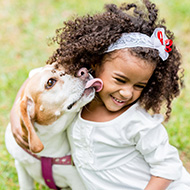"It's really important that we teach our children how to interact safely wirh dogs" - Dr Samantha Gaines, RSPCA.
The charity is reminding owners to be aware of their dog's signals.
The RSPCA is offering advice to dog owners on how to keep children safe when interacting with dogs.
This week (6-12 June) marks Child Safety Week, and the RSPCA is encouraging parents and children to be vigilant when interacting with dogs, even familiar ones, and know the signs of discomfort in dogs.
Providing three simple-to-remember steps, the charity shared these tips:
• Be alert – always keep an eye on your dog around kids, never leave them alone together.
• Be aware – get to know your dog, dogs use signals to tell us how they feel.
• Be safe – any dog can bite, accidents happen fast.
Dr Samantha Gaines, RSPCA dog welfare expert, explained: “We love our dogs and want to ensure they are always happy and comfortable, but we also want to keep our children safe, and we can do both by following these three simple steps: be alert, be aware, be safe.
“It’s really important that we teach our children how to interact safely with dogs and it’s vital that, as adults, we also supervise these interactions and know the signs to look out for that suggest our dog may be uncomfortable or anxious.
“Sadly, we know that children are often involved in dog bite incidents with consistently high numbers being admitted into hospital for treatment over the past 20 years.
“It is also important to know that the majority of bites to younger children are from familiar dogs.”
Along with other organisations, the RSPCA is part of a coalition – the Canine and Feline Sector Group (CFSG), who worked with Defra to create a Dog Safety Code, which hopes to tackle the number of dog attacks, and raise awareness of concerns for child safety when interacting with dogs.
“There are also some behaviours that place children particularly at risk. For example, they tend to get very close to objects they are interested in which can increase the likelihood of a bite to the face or head.
“This can happen very quickly but with increased awareness about this behaviour and staying alert we can help keep children safer.
“That’s why we’re issuing this message over Child Safety Week and we hope that more parents will be aware of high risk behaviours and the signs dogs use to tell us how they are feeling so their children are safe and their dogs happy.”








